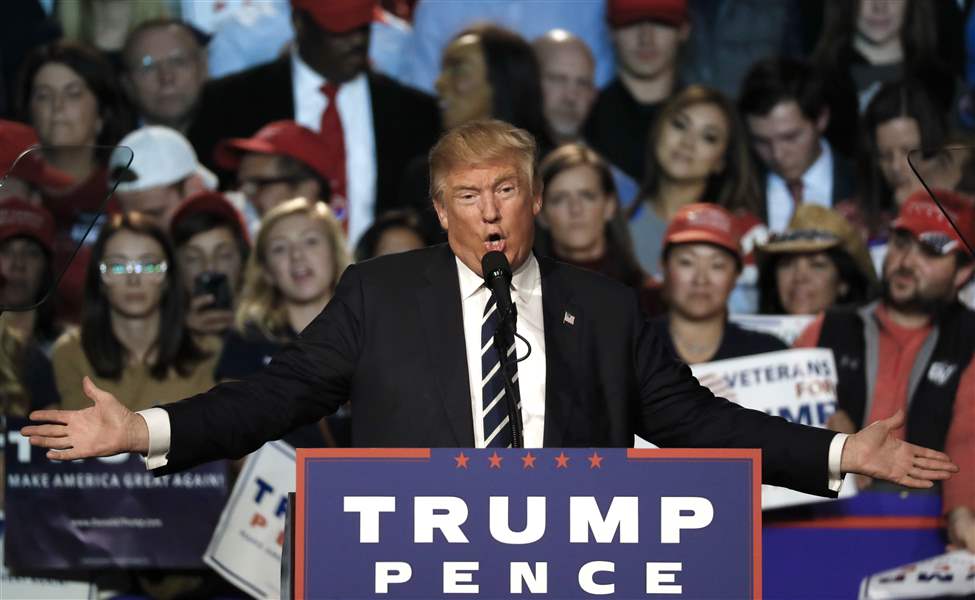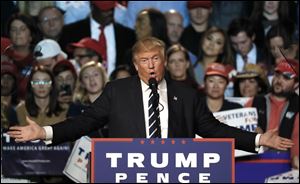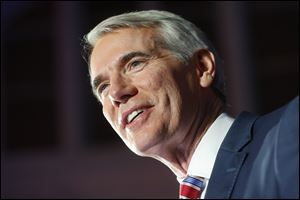
RENEGOTIATING NAFTA
Many Trump foes eager to see him act on NAFTA
But economists warn against protectionism
11/20/2016
Donald Trump speaks at a campaign rally in Grand Rapids, Mich. in November. One of Trump's campaign trail promises was to renegotiate the North American Free Trade Agreement, or NAFTA.
ASSOCIATED PRESS
If President-elect Donald Trump takes his campaign promises seriously, one that has to be at the top of his list is to renegotiate the North American Free Trade Agreement.
As far as labor representatives and Democrats are concerned, a reset of NAFTA is not an option, it’s a necessity.
NAFTA was approved by Congress in 1993 and signed into law by then President Bill Clinton. Recent campaign discussions about abolishing NAFTA helped Mr. Trump, Toledo union leaders said.

Donald Trump speaks at a campaign rally in Grand Rapids, Mich. in November. One of Trump's campaign trail promises was to renegotiate the North American Free Trade Agreement, or NAFTA.
“I’m convinced that’s what got [Mr. Trump] elected. It certainly resonated with my members,” said Ken Lortz, director of the United Auto Workers union for Ohio and Indiana, who campaigned for Mrs. Clinton.
He said he believes more than the estimated 20 to 25 percent of his membership who supported Republican Mitt Romney in 2012 gave their votes to Mr. Trump.
“We had a lot of closet Trump supporters,” Mr. Lortz said.
Mrs. Clinton carried Lucas County with 55.8 percent to Mr. Trump’s 38.6 percent, but Mr. Trump carried the state by 51.9 percent to Mrs. Clinton’s 43.4 percent.
In 2012, President Obama carried Lucas County with 65 percent of the vote to Mr. Romney’s 33.3 percent. Mr. Obama also won Ohio, 50.7 percent to 47.4 percent.
Throughout the Midwestern rust belt states of Pennsylvania, Ohio, Michigan, and Wisconsin, Mr. Trump attacked NAFTA as the reason for the loss of manufacturing jobs. The popular vote in those states gave him the electoral vote margin to defeat Democrat Hillary Clinton.
NAFTA was a big focus of what Mr. Trump talked about on the campaign trail.
“We will renegotiate NAFTA and, if we don’t get the deal we want, we will terminate NAFTA and get a much better deal,” Mr. Trump said in Warren, Mich., on Oct. 31.
In Toledo on July 27, Mr. Trump called NAFTA: “Probably the worst agreement ever signed in the history of this country — probably the history of the world.”
State data show one-third of Ohio’s manufacturing jobs have disappeared since 2000. Michigan has lost 31 percent.
In metro Toledo alone, some 5,500 jobs have been lost to foreign countries. At least 4,350 have gone to Mexico and another 900 have relocated to Canada. Barbados, China, Costa Rica, France, and Poland have also gained jobs from Toledo.
So what to do now?
A document from the Trump transition team lays out a 200-day schedule for dealing with NAFTA.
“The Trump trade plan breaks with the globalist wings of both the Republican and Democratic parties,” the document notes. “The Trump administration will reverse decades of conciliatory trade policy. New trade agreements will be negotiated that provide for the interests of U.S. workers and companies first.”
According to the memo, Mr. Trump on Day One would order the commerce department and International Trade Commission to begin a study on what the ramifications of withdrawing from the treaty would be, and what would be required legislatively in order to do so.
He would also have the U.S. Trade Representative notify Mexico and Canada that the United States intends to propose some amendments to the treaty, which could include measures on currency manipulation, lumber, country of origin labeling, and environmental and safety standards, the memo obtained by CNN reported.
The United States can withdraw from the 1994 treaty that abolished trade barriers with Canada and Mexico just by saying so.
Article 2205 states: “A Party may withdraw from this Agreement six months after it provides written notice of withdrawal to the other Parties. If a Party withdraws, the Agreement shall remain in force for the remaining Parties.”
Protectionism
Mr. Lortz sees NAFTA as a way for the UAW and Mr. Trump to cooperate.
“He wasn’t our candidate. But that’s an issue he actually came to us on and I think we need to hold him accountable on that,” Mr. Lortz said.
He said a tougher U.S. stance on NAFTA should discourage U.S. businesses from relocating to Mexico.
“We lost hundreds of thousands of jobs as a result of NAFTA. If NAFTA is reversed we ought to see those jobs come back,” Mr. Lortz said.
Mr. Trump also attacked the proposed 12-nation Trans-Pacific Partnership that President Obama negotiated — and which Mrs. Clinton initially supported — as “a total disaster.”
He talked about instituting a 45 percent tariff on goods from China and a 35 percent tariff on products made in Mexico by American companies, such as Ford Motor Co. of Michigan and Carrier of Indiana.
But while Mr. Trump talked protectionism, the Republican Party that nominated him historically has not been protectionist, and Mr. Trump could face roadblocks in Congress, where both houses are under Republican control.

Sen. Rob Portman.
U.S. Sen. Rob Portman (R., Ohio), who was elected by a 22-point margin even though he strongly supported NAFTA in the past, said during the campaign NAFTA was in need of updating.
“Well it’s a 20-plus-year-old agreement. When it was negotiated there was no e-commerce, as an example, which is a significant chapter now in all of our trade agreements. It did not have the environmental or labor standards we have in all of our agreements. So it should definitely be updated,” Mr. Portman said on CNN New Day on Thursday.
“We could do more on trade enforcement, level the playing field, ensure that currency manipulation doesn’t occur as an example, make sure companies aren’t dumping product and subsidizing product,” he said.
Proposals
Ohio Democratic U.S. Sen. Sherrod Brown said he will make sure Mr. Trump’s NAFTA campaign promises are not forgotten.
“I am calling on President-elect Trump to make good on his promise to Ohioans and offering to work with him to form a trade policy that protects American workers and creates Ohio jobs,” Mr. Brown said last week, standing in front of the Celebrezze Federal Building in Cleveland where he joined protests against NAFTA in the 1990s.
He proposed three changes to the NAFTA document:
● Getting rid of NAFTA’s investor state dispute settlement provisions, which are “corporate handouts” that allow multinational corporations to challenge U.S. law.
● Protecting U.S. autoworkers and the domestic steel industry by renegotiating NAFTA’s rules of origin, which determine how much of a product must be made in a country in order to benefit from the trade agreement.
● Making sure all companies and countries are on a level playing field so corporations don’t have incentive to ship jobs to Mexico in order to pay workers less.
Potential fallout
Many economists see NAFTA as a scapegoat for job losses that have more to do with efficiencies, such as robotics and obsolete plants being closed.
Ned Hill, professor of public affairs and city and regional planning at Ohio State University, said a withdrawal from NAFTA will drive business to Vietnam and Thailand because of the need for low-cost labor.
“If their goal is to raise trade barriers to any country that has a labor cost advantage over the U.S., two things are going to happen: There’s going to be a trade war and the American consumer is going to revolt” because of the suddenly high cost of products, he said.

Rep. Marcy Kaptur.
And the manufacturers in the United States who export to Canada, Mexico, and China — Ohio’s three biggest export customers — will suffer.
He said ideally, NAFTA would be left alone, but he acknowledges that’s unlikely.
“They’re going to have to find something that is symbolic and meaningless or risk hurting the U.S. economy,” Mr. Hill said.
U.S. Rep. Marcy Kaptur (D., Toledo) has for years introduced the Balancing Trade Act that would require the president to monitor U.S. trade accounts and adjust any in which the United States has a trade deficit over $10 billion. The bill has never been allowed on the floor for a vote.
According to the office of the U.S. Trade Representative, America last year exported $267.2 billion worth of goods and services to Mexico, and imported $316.4 billion worth, yielding a negative trade balance with Mexico of $49.2 billion in 2015.
“I am very hopeful that on a bipartisan basis we are able to constructively deal with the trade and jobs issue with the new President and begin to repair the damage that has been done, especially in the Great Lakes area,” Miss Kaptur said.
“He’s going to have to decide early on whether he wants trade with nations that observe labor and environmental standards and the rule of law or are we going to continue to reduce down to Third World Standards,” she added.
U.S. Rep. Bob Latta (R., Bowling Green) declined a Blade request for an interview about NAFTA policy.
The U.S. Chamber of Commerce argues that increased trade has been a boon to the United States. A recent report from the group found trade with Canada and Mexico nearly quadrupled to $1.3 trillion during the first two decades of NAFTA and that it supports nearly 14 million U.S. jobs, with 5 million of those attributed directly to NAFTA.
Ohio accounted for $6.5 billion worth of exports to Mexico in 2015 and $20 billion to Canada, supporting an estimated 263,000 jobs in 2014. Globally, Ohio is the eighth largest exporting state, according to the agency’s report for 2015. Canada and Mexico are Ohio’s two biggest trading partners.
Kristin Dziczek, director of the Industry, Labor, and Economics Group for the nonprofit think tank Center for Automotive Research in Ann Arbor, said, “You will probably instigate a retaliatory measure from Mexico, and we do export things there.
“A huge portion of aftermarket parts are not made in the U.S., so your auto repairs are all of a sudden a lot more expensive,” Ms. Dziczek said. “If we tip into recession overall, auto sales and production go down. The secondary impacts of a trade war cause economic impacts that would hurt U.S. workers.”
She said changes are possible within the confines of the agreement.
“Incremental movement could benefit workers, but an all-out pullout from NAFTA does not help U.S. companies and it does not help the workers,” Ms. Dziczek said.
Contact Tom Troy: tomtroy@theblade.com or 419-724-6058 or on Twitter @TomFTroy.